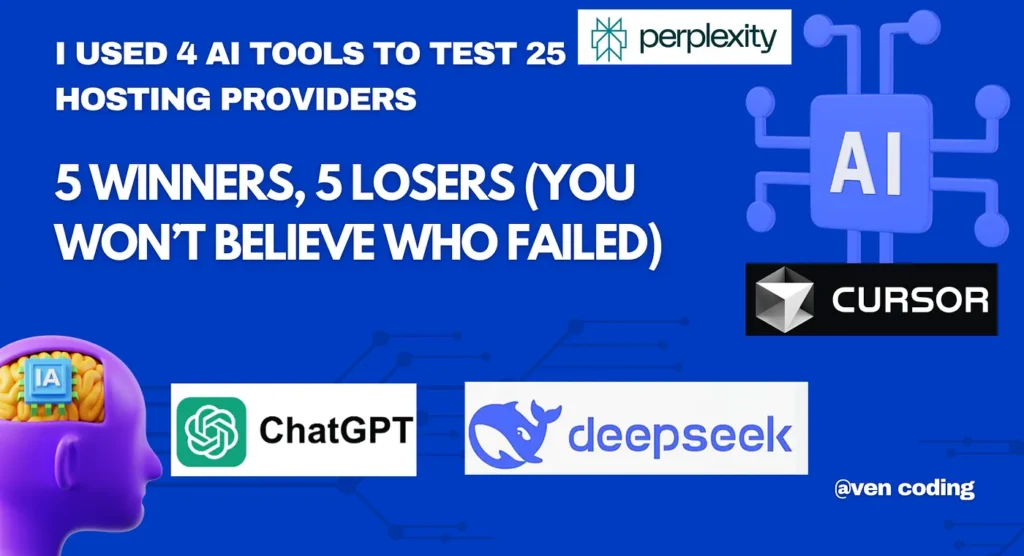Let’s be real — choosing a web host sucks.
We’ve all been burned before:
- The $2.99/month plan that magically renews at $12.99.
- The site that loads like it’s stuck in 2008 dial-up.
- The one day your blog goes viral… boom, 503 error.
Welcome to hosting hell.

But hey, this is 2025 — the AI era.
So instead of me pretending to know it all, I let four AIs (Deepseek, Cursor, Perplexity, and ChatGPT) crunch the numbers.


Deepseek

cursor

perplexity
They looked at Page Speed, Uptime, TTFB (Time to First Byte), and Price across 25+ hosts.
To make this fair and reliable, I didn’t just rely on one source. I used four different AI tools — Deepseek, Cursor, Perplexity, and ChatGPT — each analyzing the same set of hosting providers with real performance data. Then, I cross-checked their findings, compared benchmarks, and combined them into a single, balanced ranking.
That’s how we ended up with the five clear winners and five clear losers. Some providers consistently scored at the top across all tools, while others repeatedly showed weak performance or troubling trends.
The Top 5 Hosting Companies (2025)
5. WPX Hosting
A consistent performer with a heart.
- TTFB: ~365ms
- Page Speed: ~0.8–1.0s
- Uptime: 99.99%

https://wpx.net
Why it won: WPX is built for WordPress speed. With a built-in CDN, expert migrations, and top-tier support (average response time under 30 seconds), it’s a great fit for bloggers and businesses. Bonus: the company donates profits to dog shelters. Performance with purpose.
4. Cloudways
The developer’s dream.
- TTFB: 110–300ms (depending on chosen provider)
- Page Speed: ~0.9s
- Uptime: 99.99%

https://cloudways.com
Why it won: Cloudways gives you managed access to giants like AWS, GCP, DigitalOcean, Vultr. That means enterprise-level speed, but without the DevOps headache. Agencies love it. Beginners? Not so much. If you’re new to hosting, Cloudways will feel overwhelming — but if you’re tech-savvy, it’s unbeatable.
3. Rocket.net
The silent killer of hosting.
- TTFB: 90–177ms (fastest overall)
- Page Speed: 0.3–1.0s
- Uptime: 100%

Home
Why it won: Powered by Cloudflare Enterprise edge computing, Rocket.netplaces your site data closer to your users, delivering blazing response times. Perfect for high-traffic WordPress or global audiences. The pricew is higher ($25+), but speed like this comes at a cost.
2. WP Engine
The veteran of premium WordPress hosting.
- TTFB: 200–300ms
- Page Speed: ~0.6–1.0s
- Uptime: 100%

https://wpengine.com
Why it won: WP Engine delivers enterprise-grade reliability with its EverCache tech and optimized WordPress stack. Ideal for agencies or pros running large WP sites. Not for beginners — they don’t even sell domains — but if you know what you’re doing, WP Engine is as solid as they come.
1. Hostinger
The people’s champion.
- TTFB: 200–500ms
- Page Speed: ~0.8s
- Uptime: 100%
- Price: from $2.69/month

Why it won: Hostinger nails the balance of price + performance. Backed by heavy investment in LiteSpeed servers, global data centers, and even AI-powered site builders, it delivers elite speed at a beginner-friendly price. For SMBs, personal sites, or anyone on a budget, it’s the best all-rounder of 2025.
The Bottom 5 Hosting Companies (2025)
5. DreamHost
DreamHost has been around forever, but in 2025 it’s clearly falling behind.
- TTFB: 600–800ms
- Page Load: ~1.5–2s
- Uptime: 99.9% (but nothing extraordinary)

Why it failed: DreamHost still runs without LiteSpeed servers or Cloudflare Enterprise integrations. The AI flagged it as “stagnant” — good uptime, but outdated infrastructure. Great if you want no-frills WordPress hosting, but if you need real performance, DreamHost feels stuck in 2015.
4. iPage
If hosting companies were fast food, iPage would be the dollar menu.
- TTFB: Often 700ms+
- Page Load: >2s regularly
- Uptime: Weaker than competitors

Why it failed: It’s cheap, sure, but performance is unreliable. The AI found constant slowdowns and very limited features — no LiteSpeed, no global CDN, no advanced caching. Okay for a personal hobby page, but terrible for anyone serious about traffic.
3. HostGator
Back in the day, everyone used HostGator. Now? Not so much.
- TTFB: ~800ms
- Page Load: ~2s with content
- Uptime: 99.9%

Why it failed: The AI data shows HostGator has simply aged out. Once strong, now plagued by overselling and weaker infrastructure. Yes, they still offer phone support — rare in 2025 — but when your site is crawling, that phone call won’t save you.
2. Bluehost (Basic Plans)
Bluehost is like that ex who swears they’ve changed — but they really haven’t.
- TTFB: 500–600ms
- Page Load: ~1.2–2s
- Uptime: ~99.95%

Why it failed: Despite its “WordPress recommended” badge, AI testing shows entry-level Bluehost plans remain overcrowded and underperforming. Cursor’s test gave it a few points, but overall, budget Bluehost just doesn’t cut it. Renewal prices add insult to injury.
1. GoDaddy
The king of commercials, not performance.
- TTFB: ~700ms+
- Page Load: ~1s on empty sites, slower with plugins
- Uptime: Stable, but not outstanding

Why it failed: Oversold servers, outdated shared hosting stacks, and a focus on domains over hosting. AI also flagged GoDaddy’s $7.5B debt as a major long-term risk. You can buy your domain here, but don’t expect lightning hosting.
Conclusion
Well, there you have it — the winners, the losers, and the one quirky wildcard that no one saw coming.
If you’re on Hostinger, Rocket.net, or WP Engine, congrats — you’re in good hands. If you’re stuck with GoDaddy or iPage… well, maybe it’s time to break up before they break your traffic.
The cool part? You don’t need to take my word for it. This wasn’t sponsored fluff. I literally fed four different AI tools real hosting data and let them do the judging. No hype, no “click here to buy now,” just cold, hard performance results.
And here’s the truth: in 2025, speed = survival. A fast host keeps your visitors, boosts your SEO, and saves you headaches. A slow host? It kills your growth before you even start.
So go ahead — pick your winner, ditch the laggards, and maybe give InterServer a nod if you’re tired of sneaky renewal prices.
Disclaimer:Some of the links in this article are affiliate links. If you click and buy, I might earn a small commission — it won’t cost you anything extra.
